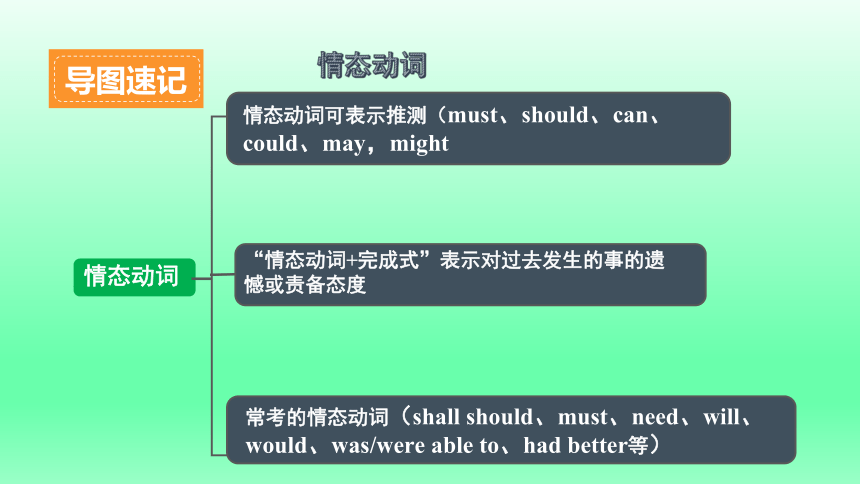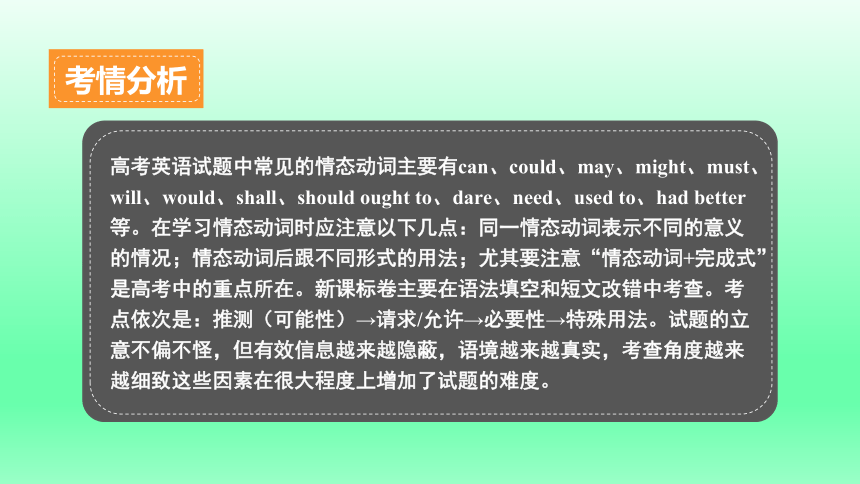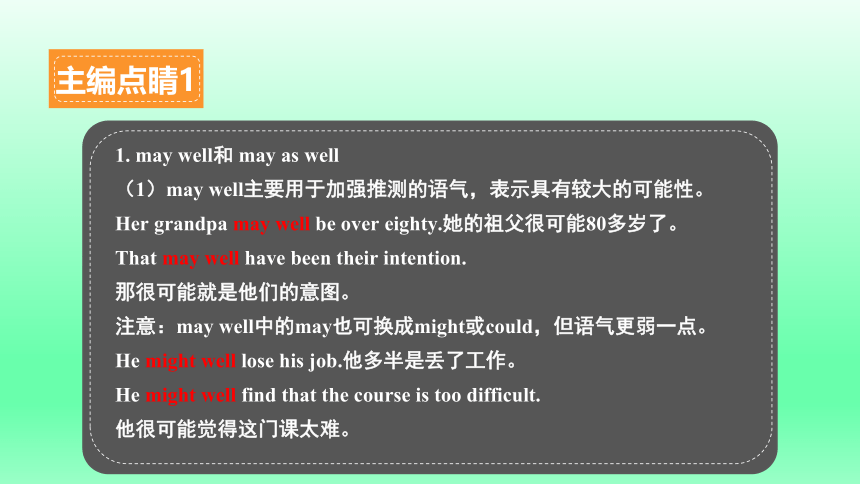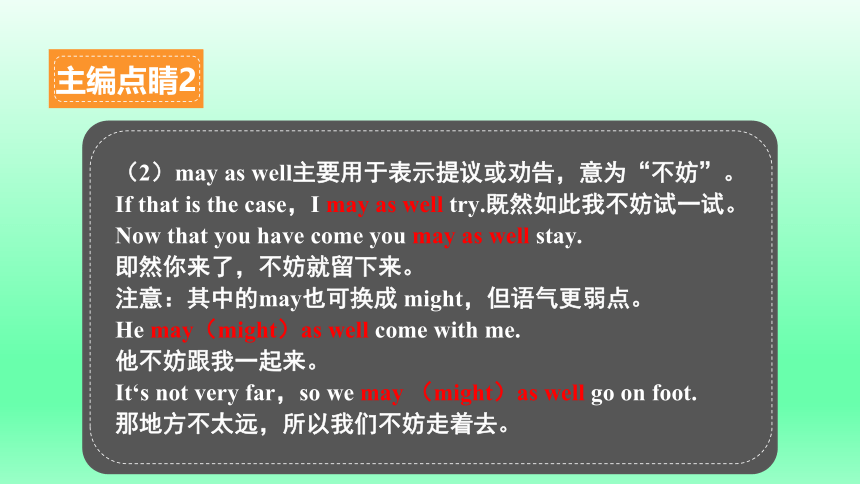人教版(2019)必修第三册 Unit5 The Value of Money单元语法详解课件(共10张PPT)
文档属性
| 名称 | 人教版(2019)必修第三册 Unit5 The Value of Money单元语法详解课件(共10张PPT) |  | |
| 格式 | pptx | ||
| 文件大小 | 341.5KB | ||
| 资源类型 | 教案 | ||
| 版本资源 | 人教版(2019) | ||
| 科目 | 英语 | ||
| 更新时间 | 2023-03-10 22:19:28 | ||
图片预览





文档简介
(共10张PPT)
语法详解
Unit 5 The Value Of Money
情态动词
导图速记
情态动词可表示推测(must、should、can、could、may,might
常考的情态动词(shall should、must、need、will、would、was/were able to、had better等)
情态动词
“情态动词+完成式”表示对过去发生的事的遗
憾或责备态度
高考英语试题中常见的情态动词主要有can、could、may、might、must、will、would、shall、should ought to、dare、need、used to、had better等。在学习情态动词时应注意以下几点:同一情态动词表示不同的意义的情况;情态动词后跟不同形式的用法;尤其要注意“情态动词+完成式”是高考中的重点所在。新课标卷主要在语法填空和短文改错中考查。考点依次是:推测(可能性)→请求/允许→必要性→特殊用法。试题的立意不偏不怪,但有效信息越来越隐蔽,语境越来越真实,考查角度越来越细致这些因素在很大程度上增加了试题的难度。
考情分析
1. may well和 may as well
(1)may well主要用于加强推测的语气,表示具有较大的可能性。
Her grandpa may well be over eighty.她的祖父很可能80多岁了。
That may well have been their intention.
那很可能就是他们的意图。
注意:may well中的may也可换成might或could,但语气更弱一点。
He might well lose his job.他多半是丢了工作。
He might well find that the course is too difficult.
他很可能觉得这门课太难。
主编点睛1
(2)may as well主要用于表示提议或劝告,意为“不妨”。
If that is the case,I may as well try.既然如此我不妨试一试。
Now that you have come you may as well stay.
即然你来了,不妨就留下来。
注意:其中的may也可换成 might,但语气更弱点。
He may(might)as well come with me.
他不妨跟我一起来。
It‘s not very far,so we may (might)as well go on foot.
那地方不太远,所以我们不妨走着去。
主编点睛2
2. can/could常用于表示现在/过去的能力。
I could drive a car before I graduated我毕业前就会开车。
3. may除了表示推测,还可表示征求对方的意见、允许或祝愿。
You may leave when you‘ve finished,“he said。
他说:“你完成以后就可以走。”
4. should除了表示推测,还可以表示现在或将来的责任或义务,或表示说话人惊奇、愤怒、失望等的感情。
——You should paint your door.
——Yes. I know I should.
你应当用油漆刷一下你的门对,我知道我该这样做。
5. 以need或must开头的疑问句,肯定回答用must,否定回答用 needn't
主编点睛3
过去将来时
导图速记
would/should do
条件、时间状语从句中用一般过去时代替过去将来时
过去将来时
was/were going to do
was/were about to do
was/were to do
was/were doing(come、go、leave、arrive、star
等非延续性动词)
动词时态的考查一直是高考的考查重点。试题命题本着“情景立意”和“能力立意”的原则,即在考查固定句式中的时态的同时,注重在语境中考查时态。过去将来时表示从过去的某一时间来看将来要发生的动作或呈现的状态。过去将来时常用于宾语从句和间接引语中。
考情分析
过去将来时典型错误例析
1. 我们不知道他是否要在会上发言。
误:We didn’t know whether he is going to speak at the meeting.
正:We didn’t know whether he was going to speak at the meeting
析:该句主句为一般过去时,且宾语从句表示从过去某个时间来看将要发生的动作,所以从句要用过去将来时。
2. 老师问汤姆长大后准备干什么。
误: The teacher asked Tom what he was going to do when he would grow up.
正: The teacher asked Tom what he was going to do when he grew up.
析:在时间状语从句中,常用一般过去时表示在过去看来将要发生的动作
主编点睛1
3. 他们说如果下周日不下雨他们就去农场。
误:They said that they were going to the farm if it would not rain the next Sunday.
正:They said that they were going to the farm if it didn't rain the next Sunday.
析:在条件状语从句中,常用一般过去时表示在过去看来将要发生的动作。
4. 王琳打电话告诉她妈妈,她要买一些书。
误: Wang Lin rang up to tell her mom that she should buy some books .
正: Wang Lin rang up to tell her mom that she would buy some books.
析:过去将来时可以由“助动词 should would+动词原形”表示,但 should一般只用于第人称,而 would可用于各种人称。
5. 上次我见到你时,你正打算开始乘火车去西藏。
误: Last time I saw you,you had started to go to Tibet by train.
正: Last time I saw you,you were going to start to go to Tibet by train.
析:表示过去的打算,用过去将来时。
主编点睛2
语法详解
Unit 5 The Value Of Money
情态动词
导图速记
情态动词可表示推测(must、should、can、could、may,might
常考的情态动词(shall should、must、need、will、would、was/were able to、had better等)
情态动词
“情态动词+完成式”表示对过去发生的事的遗
憾或责备态度
高考英语试题中常见的情态动词主要有can、could、may、might、must、will、would、shall、should ought to、dare、need、used to、had better等。在学习情态动词时应注意以下几点:同一情态动词表示不同的意义的情况;情态动词后跟不同形式的用法;尤其要注意“情态动词+完成式”是高考中的重点所在。新课标卷主要在语法填空和短文改错中考查。考点依次是:推测(可能性)→请求/允许→必要性→特殊用法。试题的立意不偏不怪,但有效信息越来越隐蔽,语境越来越真实,考查角度越来越细致这些因素在很大程度上增加了试题的难度。
考情分析
1. may well和 may as well
(1)may well主要用于加强推测的语气,表示具有较大的可能性。
Her grandpa may well be over eighty.她的祖父很可能80多岁了。
That may well have been their intention.
那很可能就是他们的意图。
注意:may well中的may也可换成might或could,但语气更弱一点。
He might well lose his job.他多半是丢了工作。
He might well find that the course is too difficult.
他很可能觉得这门课太难。
主编点睛1
(2)may as well主要用于表示提议或劝告,意为“不妨”。
If that is the case,I may as well try.既然如此我不妨试一试。
Now that you have come you may as well stay.
即然你来了,不妨就留下来。
注意:其中的may也可换成 might,但语气更弱点。
He may(might)as well come with me.
他不妨跟我一起来。
It‘s not very far,so we may (might)as well go on foot.
那地方不太远,所以我们不妨走着去。
主编点睛2
2. can/could常用于表示现在/过去的能力。
I could drive a car before I graduated我毕业前就会开车。
3. may除了表示推测,还可表示征求对方的意见、允许或祝愿。
You may leave when you‘ve finished,“he said。
他说:“你完成以后就可以走。”
4. should除了表示推测,还可以表示现在或将来的责任或义务,或表示说话人惊奇、愤怒、失望等的感情。
——You should paint your door.
——Yes. I know I should.
你应当用油漆刷一下你的门对,我知道我该这样做。
5. 以need或must开头的疑问句,肯定回答用must,否定回答用 needn't
主编点睛3
过去将来时
导图速记
would/should do
条件、时间状语从句中用一般过去时代替过去将来时
过去将来时
was/were going to do
was/were about to do
was/were to do
was/were doing(come、go、leave、arrive、star
等非延续性动词)
动词时态的考查一直是高考的考查重点。试题命题本着“情景立意”和“能力立意”的原则,即在考查固定句式中的时态的同时,注重在语境中考查时态。过去将来时表示从过去的某一时间来看将来要发生的动作或呈现的状态。过去将来时常用于宾语从句和间接引语中。
考情分析
过去将来时典型错误例析
1. 我们不知道他是否要在会上发言。
误:We didn’t know whether he is going to speak at the meeting.
正:We didn’t know whether he was going to speak at the meeting
析:该句主句为一般过去时,且宾语从句表示从过去某个时间来看将要发生的动作,所以从句要用过去将来时。
2. 老师问汤姆长大后准备干什么。
误: The teacher asked Tom what he was going to do when he would grow up.
正: The teacher asked Tom what he was going to do when he grew up.
析:在时间状语从句中,常用一般过去时表示在过去看来将要发生的动作
主编点睛1
3. 他们说如果下周日不下雨他们就去农场。
误:They said that they were going to the farm if it would not rain the next Sunday.
正:They said that they were going to the farm if it didn't rain the next Sunday.
析:在条件状语从句中,常用一般过去时表示在过去看来将要发生的动作。
4. 王琳打电话告诉她妈妈,她要买一些书。
误: Wang Lin rang up to tell her mom that she should buy some books .
正: Wang Lin rang up to tell her mom that she would buy some books.
析:过去将来时可以由“助动词 should would+动词原形”表示,但 should一般只用于第人称,而 would可用于各种人称。
5. 上次我见到你时,你正打算开始乘火车去西藏。
误: Last time I saw you,you had started to go to Tibet by train.
正: Last time I saw you,you were going to start to go to Tibet by train.
析:表示过去的打算,用过去将来时。
主编点睛2
